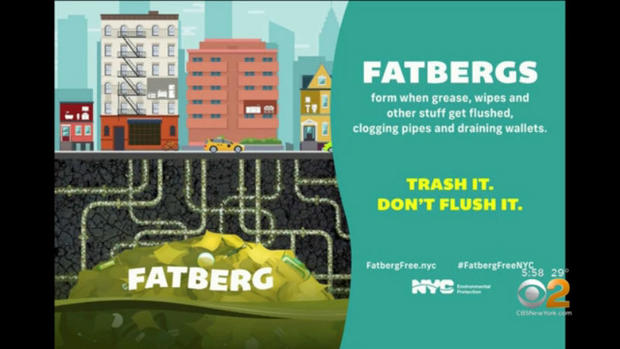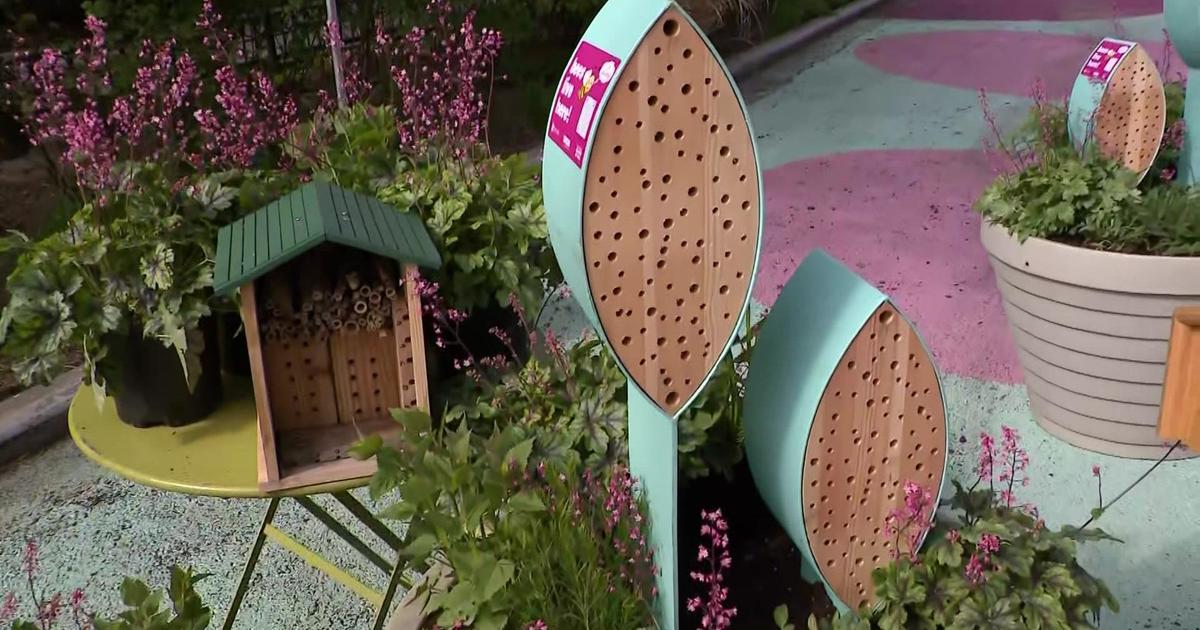Exclusive: NYC Waging Costly War Against 'Fatbergs'
NEW YORK (CBSNewYork) -- New Yorkers are told not to flush wipes, dental floss and other plastics down the drain, but they do it anyway.
When all that waste combines, it creates a clog known as a "fatberg." It causes back-ups and is costing the city a fortune.
CBS2's Lisa Rozner got an exclusive look at how the city is tackling the threat.
From the toilet to the Newtown Creek Wastewater Treatment Plant in Greenpoint, cooking grease combined with baby wipes is ruining equipment and has Department of Environmental Protection workers doing overtime to weed it out.
"Folks feel if it's good for baby, it's good for them, but more and more we've been seeing them clogging the sewer system," city DEP Commissioner Vincent Sapienza said Wednesday.
MORE: New Jersey Homeowner Says 'Fatberg' Caused Raw Sewage To Flood Basement
The words "fat" and "iceberg" are combined to describe a congealed mass of grease and personal hygiene products. Last month, workers had to remove one such clog from pipes in Jamaica, Queens.
Workers in the United Kingdom found recently found one 210 feet long and a few years ago located one that was nearly 1,000 feet long. A fatberg of that size takes weeks to remove.
"And can cause backups of sewage. It can cause street flooding. So they are a problem, a growing problem," Sapienza said.
Last year, almost 90 percent of the city's sewer back-ups were caused by grease and wipes. That means there were more than 2,000 mini-fatbergs citywide.
FLASHBACK: Grease Dumping Is Leading To Sewer Backups In Southeast Queens, Officials Say
As the raw sewage comes in from people's homes and catch basins on the street, it travels to the treatment plant and meets its first line of defense -- a gate that prevents wipes and other kinds of products from getting through.
"And whatever material that got caught on those bars is now getting pulled up and as you can see a lot of it is flushable wipes," Sapienza said. "It's on top of the rake. The rake is now bringing those wipes all the way to the top, to the main floor of the plant, where it's going to be put into a dumpster to be carried away."
In 2017, more than 50,000 tons of debris were transported to landfills. That's equivalent to dozens of Olympic-size swimming pools. The price tag for that cleanup was around $18 million, triple from a decade ago, CBS2's Rozner reported.
Now, the city is educating New Yorkers in a new ad campaign.
"Only flush the four 'Ps' -- poop, pee, paper and puke -- and don't flush wipes, grease or any other items," NYC DEP senior adviser Mikelle Adgate said.
Other Dos and Don'ts include:
- DO NOT flush wipes or other trash down the toilet, even if they're labeled flushable.
- DO NOT pour grease down kitchen sinks or toilets. Instead, put grease in a sealed non-recyclable container and throw out with regular garbage.
- DO toss dirty baby, makeup and cleaning wipes, tampons, sanitary pads and condoms in the trash.
- DO reduce and reuse by using compostable or reusable makeup applicators, like cotton balls, and cleaning supplies, like paper towels or rags.
- DO recycle finished toilet rolls, cardboard packaging from toothpaste and brushes, and plastic packaging from shampoos and shower gels.
The city is calling it the "fight against fatbergs," with the goal of having a fatberg-free NYC.
The DEP says New Yorkers also need to trash wipes that are labeled "flushable." They may make it down your toilet, but none of them make it through sewer pipes.




